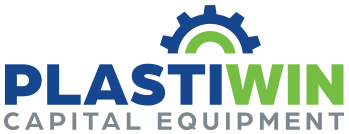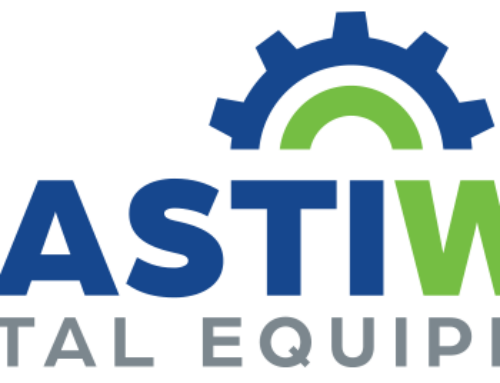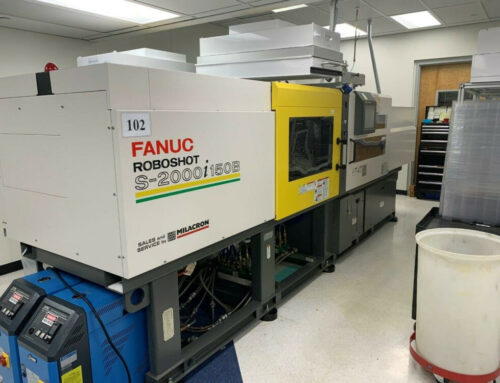Top 7 tips to increase the resale value of your used plastic processing equipment
Whether driven by the need to upgrade technology, downsize operations, or simply adapt to market changes, many companies find themselves in the position of selling their used plastic processing equipment. The resale of this machinery represents a significant opportunity to recoup a portion of the initial investment, making it a strategic decision for businesses of all sizes.
Achieving the best possible resale value for used plastic processing equipment is not a simple endeavor. It demands a comprehensive understanding of the equipment itself, the market it serves, and the factors influencing its value. This whitepaper serves as a guide to navigating this complex process, offering insights, strategies, and best practices to help businesses optimize their return on investment when selling used plastic processing equipment.
Tip #1: Show the equipment running in person
A live demonstration provides concrete proof that the equipment is in good working order. It reassures the buyer that the machinery can perform as expected, reducing doubts and uncertainties about its condition. Allowing buyers to witness the equipment in action builds trust and transparency in the transaction. Buyers are more likely to have confidence in the purchase when they can see the machinery’s performance firsthand.
A working demonstration showcases the quality of the machinery’s output. This is especially important for equipment that produces plastic products, as it assures the buyer that the machinery can meet their production needs and standards. Buyers can make quicker decisions when they have seen the equipment in operation. This can expedite the sales process and potentially lead to a faster transaction, benefiting both the seller and the buyer. Buyers gain peace of mind when they have a clear understanding of how the machinery operates. This can result in a more positive overall experience and a higher likelihood of repeat business or referrals.
Demonstrations offer an opportunity to educate buyers about the machinery’s operation, maintenance, and best practices. This can facilitate a smoother transition once the equipment is in the buyer’s facility.
Tip #2: Show the equipment running via video
Using video to show machinery working to prospective buyers offers numerous benefits which align with the advantages of demonstrating the equipment in person while also providing some unique advantages associated with digital media.
Video demonstrations enable remote viewing, allowing potential buyers from different geographical locations to assess the equipment without the need for a physical visit. This significantly expands the reach of your sales efforts. Buyers can watch the video at their convenience, saving time and reducing travel expenses. This flexibility can lead to faster decision-making and increased interest from a broader audience. Videos can be easily shared via email, messaging apps, and social media, making it simple for potential buyers to forward the demonstration to decision-makers within their organization.
Video demonstrations ensure that each potential buyer receives a consistent and standardized view of the equipment’s operation. This consistency helps in delivering a clear and uniform message about the machinery.
Videos can be available online 24/7, enabling interested parties to view the equipment in operation at any time, making it convenient for international buyers in different time zones. Videos can offer close-up shots and details of the machinery’s operation, which might be difficult to observe in an in-person demonstration. This can be especially useful for complex or intricate equipment.
A video demonstration serves as a record of the equipment’s condition and operation at the time of sale, potentially reducing disputes or disagreements after the transaction.
Tip #3: Showcase photography
Photographing used machinery for resale is a critical part of the sales process. High-quality images can attract potential buyers and give them a clear understanding of the equipment’s condition and features. Here are some tips for effectively photographing used machinery:
Clean and prepare the machinery. Thoroughly clean the machinery to remove dirt, dust, and any other contaminants. Ensure that the equipment is in its best possible condition, including making any necessary repairs or maintenance.
Take photos from different angles to provide a comprehensive view of the machinery.
Include close-ups of key components, controls, and any specific features. Highlight any distinguishing features, labels, or serial numbers.
If the machinery is potentially dangerous, ensure that safety precautions are evident in the images. For instance, show safety guards, warning labels, and proper use.
Consider capturing a series of images showing different stages of operation if applicable. This can help buyers understand how the equipment functions. And if there are visible flaws or wear and tear, document them with clear photographs. Honesty is essential in building trust with buyers.
Provide multiple images to create a comprehensive gallery that showcases all aspects of the machinery.
Tip #4: Present original OEM specifications
The more information you can provide about the equipment specs, the easier it is to match to a potential buyer. Listing the exact model number and options goes a long way.
OEM specifications are created by the manufacturer, who has in-depth knowledge of the machine’s design and intended performance. Presenting the original OEM specs goes a long way in telling potential buyers that the equipment has always been operated in accordance with the manufacturer’s guidelines. Buyers appreciate OEM specs because OEM specifications often include safety guidelines and recommendations. Adhering to these guidelines helps minimize the risk of accidents and injuries, as they are based on the manufacturer’s understanding of the machine’s potential hazards and safe operating procedures.
If the machinery is under warranty, following OEM specifications is often a requirement to maintain warranty coverage. Deviating from these specs could void the warranty.
Tip #5: Include full equipment history including maintenance
The maintenance history helps potential buyers assess the current condition of the machine. They can see when and how maintenance and repairs were performed, which provides valuable insights into its overall health and potential future issues. Buyers are more likely to have confidence in a machine with a well-documented maintenance history. They can gauge how well the equipment has been cared for and its past performance, which can influence their decision. Buyers often want peace of mind when making a significant investment in industrial machinery. Having access to a complete maintenance history can provide this assurance and reduce concerns about unforeseen problems.
As a seller, providing a maintenance history can give you a stronger negotiating position. Buyers may be more willing to pay your asking price if they have confidence in the machine’s condition and maintenance.
Tip #6: Work with a certified appraiser
Certified appraisers have the expertise and knowledge to accurately determine the value of industrial machinery. They use standardized appraisal methods and tools to provide a reliable estimate of the equipment’s worth. They are well-versed in market trends and conditions, allowing them to provide valuations that reflect the current state of the industry. This knowledge is critical for establishing competitive and realistic pricing.
An accurate appraisal helps you avoid underpricing, which can result in lost revenue, or overpricing, which can deter potential buyers. It strikes a balance that ensures fair market value.
Appraisers often have networks and connections in the industry, which can help you connect with potential buyers. They may be able to market your machinery more effectively, increasing your chances of a successful sale. Having a certified appraiser involved in the sale adds credibility to the transaction. Buyers are more likely to trust an appraisal from a certified professional, which can facilitate the sales process.
Tip #7: Hire the broker that can give your used equipment the most exposure
Brokers typically have an established network of potential buyers, including businesses, dealers, and industry contacts. This network can help you reach a wider audience and find qualified buyers more efficiently than if you were selling on your own. Brokers have the resources and experience to effectively market your machinery. They can create professional listings, utilize industry-specific advertising channels, and develop marketing strategies to attract the right buyers. Selling industrial machinery can be a time-consuming process. Brokers can handle the entire sales process, from initial valuation and marketing to negotiations and closing the deal, allowing you to focus on your core business activities.
Brokers can facilitate the sales process, from vetting potential buyers to managing inspections and paperwork. They can help ensure that the transaction proceeds smoothly and efficiently. Brokers are often well-versed in the legal and regulatory requirements associated with machinery sales. They can help you navigate these complexities, reducing the risk of legal issues. Having a broker involved in the sale adds professionalism and credibility to the process.
Plastiwin can help you get the best price for used equipment
As a recognized and respected appraiser and broker of used plastic manufacturing equipment, Plastiwin is dedicated to getting the best price for your machinery. With online listings and a vast network of buyers and sellers, Plastiwin is a pivotal link in the ever-evolving world of plastic manufacturing. Their expertise, network, and commitment to facilitating successful transactions make them indispensable to sellers looking to find new homes for their equipment and buyers seeking reliable and cost-effective machinery. Whether you are upgrading, downsizing, or simply seeking the right plastic manufacturing equipment, Plastiwin can help you navigate the complex journey with ease and efficiency.
For immediate assistance with your used equipment, call Plastiwin at (330) 998-6738.




